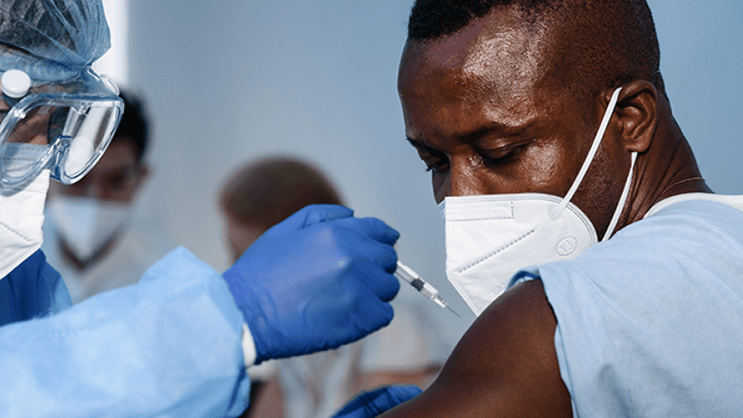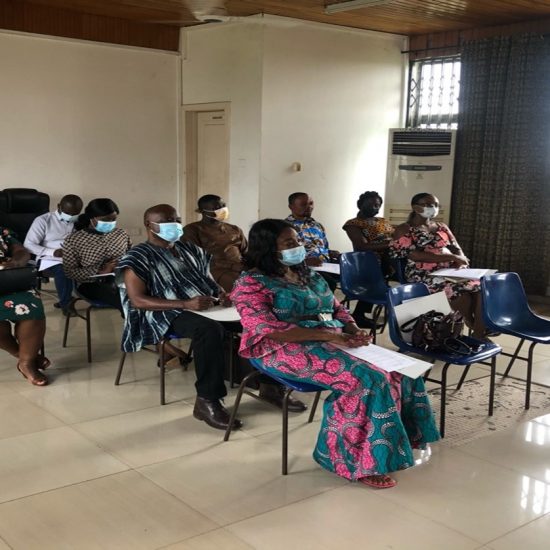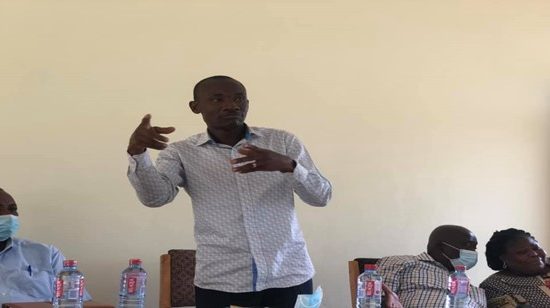
What are the benefits of getting a COVID-19 vaccine?
COVID-19 is easily transmitted and can lead to serious illness and death, even for people who are young and healthy.
Vaccines for COVID-19 will only be approved for use in this country if large, rigorous, and thorough scientific studies show that they safely reduce your risk of getting COVID-19. They would do that by preparing your body’s natural defences – the immune system – to recognize and fight off the virus that causes COVID-19.
Scientists are studying whether people who get vaccinated for COVID-19 would also be less likely to pass the COVID-19 virus on to other people. If that’s the case, getting vaccinated could be a powerful way to not only protect yourself, but also your entire community.
How will we know if COVID-19 vaccines are safe?
COVID-19 vaccines go through rigorous, multi-stage testing process, including studies that involve tens of thousands of people. These trials, which include people at high risk for COVID-19, are specifically designed to identify any common side effects or other safety concerns.
At the moment, vaccines available for COVID-19 have efficacy of between 60-94%, and are effective in preventing symptomatic disease. The World Health Organization guidance is that COVID-19 vaccines should demonstrate at least 50% efficacy against severe disease.
Have COVID-19 vaccines been approved for use in Ghana?
Yes. The Food and Drugs Authority (FDA) has given Emergency Use Authorization to two COVID-19 vaccines: (i) Sputnik V vaccine from Generium Joint Stock Company, Russia; and (ii) Covishield from the Serum Institute of India. The FDA, a WHO Maturity Level 3 regulatory agency, has reviewed both of these vaccines and concluded that they are efficacious, safe and of good quality
When will COVID-19 vaccines be ready for distribution in Ghana?
The COVID-19 vaccine will be distributed in phases in Ghana. The first phase will be will start in March, 2021.
Will there be enough COVID-19 vaccines for everyone? If not, who will get them first?
It is likely that the supply of COVID-19 vaccines will be limited at first, which means not everyone will be able to get vaccinated right away.
As doses of COVID-19 vaccines become available, they will be provided first to those at highest risk. The specific groups that are eligible for the first doses of COVID-19 vaccines may vary depending on the vaccine. However, initial groups will likely include frontline health workers at high risk of infection, older adults, and people at high risk of death because of underlying conditions like asthma, heart disease and diabetes. Once adequate doses become available, we will encourage all those who qualify to get vaccinated.
Will vaccines authorized in Ghana be as effective as the ones in other countries?
Yes. The COVID-19 vaccine authorized in Ghana will be as effective as any vaccine authorized by other countries. This is because various phases of clinical trials data reviewed by the FDA showed that the vaccines are safe and efficacious.
Will COVID-19 vaccines provide long-term protection?
The COVID-19 vaccines will provide protection for at least a year – if not longer. This will be updated when information becomes available. Early data from clinical trials indicate that some vaccines will require two doses.
If I get a COVID-19 vaccine, will I still need to take other precautions such as physical distancing, wearing of mask and other?
Yes. Stopping a pandemic requires using all the tools available. Vaccines strengthen your immune system so that it is ready to fight off the virus if you are exposed. Other steps, like masks and social distancing, help reduce your chances of being exposed or spreading the virus. Together, vaccination against COVID-19 and recommendations on how to protect yourself and others will provide the best protection against COVID-19.
If I have had COVID-19 before and have recovered, do I still need to be vaccinated with a COVID-19 vaccine when it is available?
There is not enough information currently available to say whether or for how long after infection a person is protected against COVID-19 again. This is called natural immunity. Early evidence suggests that natural immunity to COVID-19 may not last very long, but more studies are needed to better understand this.
How quickly could COVID-19 vaccines control the pandemic?
We don’t know how quickly COVID-19 vaccines could control the pandemic. That will depend on many factors, such as the level of vaccine effectiveness; how quickly they are approved and manufactured; how many people get vaccinated; and the continuation of measures such as physical distancing and mask use. In the UK, with 20 million people vaccinated, the pandemic is said to be about 80% controlled.
How can I learn more about COVID-19 vaccines?
Everyone is encouraged to rely on reputable and authoritative sources of information, such as health care providers and public health officials, to help them make informed choices and stay up to date. The latest information about COVID-19 vaccines from the World Health Organization is available here.
How is it possible to develop a safe vaccine so quickly?
While COVID19 vaccines have been developed faster than any other vaccine in history, safety was just as much a focus as in any other vaccine development. Scientists prioritized COVID19 vaccine development because of the global emergency.
The vaccines that are now being reviewed and approved by regulatory bodies have been through the same amount of testing and safety processes as other vaccines. The speed in the development of COVID-19 vaccine has also been made possible because of the availability of new tools and technologies used in vaccine development.
What is vaccine confidence?
Vaccine confidence is the belief that vaccination, and the providers, private sector, and political actors behind it, serve the public’s best health interests. Like ‘hesitancy,’ it is highly variable and rooted in political economic context. This will affect the populations’ trust in vaccines.
Can the vaccine give me COVID-19?
No. You cannot get COVID 19 from the vaccine. As of December 2020, vaccines being administered or reviewed for approval did not contain any live virus of the type that causes COVID-19.
How quickly does the vaccine work? How long does it last?
Your immune system needs to generate a response, so generally the protection from the virus starts after about seven days. In the case of vaccines which need to be given in two doses, that means that you benefit from the full protection of the vaccine about a week after the second dose. We don’t yet know for sure how long protection will last. It is likely to be at least several months, but it may be that repeat vaccinations are needed. Researchers are studying this closely.
Is it safe for me to get a COVID-19 vaccine if I would like to have a baby one day?
Yes. People who want to get pregnant in the future may receive the COVID-19 vaccine. Based on current knowledge, experts believe that COVID-19 vaccines are unlikely to pose a risk to a person trying to become pregnant in the short or long term. Scientists study every vaccine carefully for side effects immediately and for years afterward.
The COVID-19 vaccines are being studied carefully now and will continue to be studied for many years, similar to other vaccines. The COVID-19 vaccine, like other vaccines, works by training our bodies to develop antibodies to fight against the virus that causes COVID-19, to prevent future illness.
There is currently no evidence that antibodies formed from COVID-19 vaccination cause any problems with pregnancy, including the development of the placenta.
In addition, there is no evidence suggesting that fertility problems are a side effect of COVID-19 vaccine. People who are trying to become pregnant now or who plan to try in the future may receive the COVID-19 vaccine when it becomes available to them.
What is Emergency Use Authorization (EUA)?
This is when a medical product is authorized for use during a pandemic to ensure timely access to much needed health products. The objective is to make medicines, vaccines and diagnostics available as rapidly as possible to address the emergency, while adhering to stringent criteria of safety, efficacy and quality. This authorization is given for the duration of the pandemic. In the EUA manufactures are requested to submit any additional documentation on the product as and when it becomes available.
EUA is given only when the National Regulatory Authority (NRA) is satisfied that the product has met all efficacy, safety and quality specifications.
Do the COVID19 vaccines have adverse reactions?
Like all medicines, vaccines can cause adverse reactions. Most of these are mild and short term, such as pain at the injection site, tiredness or a headache. Many people don’t get any side effects. It can happen with many vaccines that some people might feel slightly unwell because their immune system is responding to the protein, but this is not a COVID-19 illness and the vaccine can’t give you COVID-19.
How can one report of adverse reactions to the COVID-19 vaccine
In the unlikely event of an adverse reaction such as fever, welling of the injection site or fever after receiving the vaccine, you can report to the nearest health facility for treatment and also send a report to the Medsafety App.
What to do to keep yourself and others safe from COVID-19?
WHO recommends the following combined actions:
- Maintain at least a 1-metre distance between yourself and others to reduce your risk of infection when they cough, sneeze or speak; maintain an even greater distance between yourself and others when indoors.
- Make wearing a mask a normal part of being around other people. The appropriate use, storage and cleaning or disposal are essential to make masks as effective as possible.
- Clean your hands before you put your mask on, as well as before and after you take it off, and after you touch it at any time.
- Make sure it covers your nose, mouth and chin.
- When you take off a mask, store it in a clean plastic bag, and every day either wash it if it’s a fabric mask, or dispose of a medical mask in a trash bin.
- Don’t use masks with valves.
- Get the COVID-19 vaccine
Source: https://www.unicef.org/ghana/information-covid-19-vaccine




